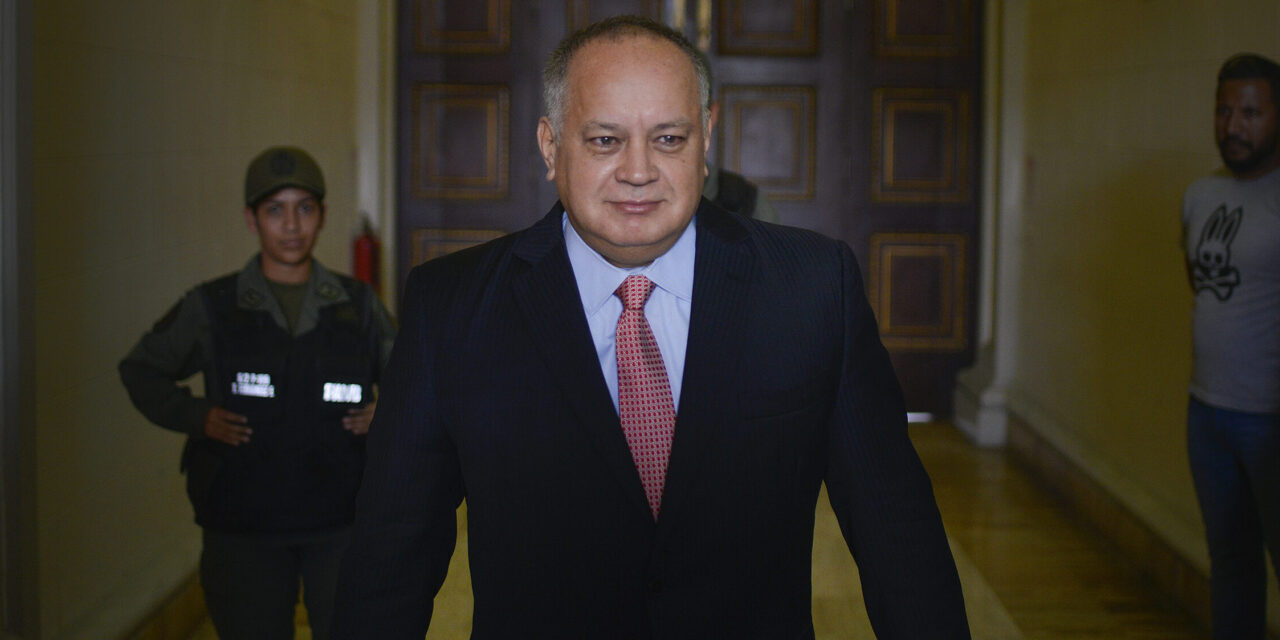Coverage of Nicolas Maduro’s authoritarian consolidation of power in Venezuela has mostly focused on his success in dividing and neutralizing the opposition, as well as maintaining control of the military and intelligence apparatus. But in recent days Maduro may have also succeeded in sidelining one of his biggest internal rivals within Chavismo: Diosdado Cabello.
It’s no secret that Maduro and Cabello have long been internal rivals. When Hugo Chavez died in 2013, the two vyed for leadership within the ruling United Socialist Party (PSUV). While Maduro was Chavez’s vice president and chosen successor, Cabello had more connections to the military and was then head of the National Assembly. There were numerous reports that the two were jockeying for power at the time.
Even after Maduro cemented his hold on the presidency with a narrow electoral victory in 2013, Cabello continued to enjoy outsized power as Vice President of the PSUV. His weekly show, Con el Mazo Dando, serves as a propaganda tool for Chavismo’s reduced base as well as a way to harass and intimidate critics. When Cabello assumed the role of President of the illegitimate National Constituent Assembly in June of 2018, it was widely assumed that he was asserting control of the rubber stamping body.
In recent weeks, however, some have suggested there may be signs that Maduro has quietly boxed Cabello out of power. In Venezuela’s annual military promotion ceremony on July 7, for instance, Venezuela military watchers noted that Maduro allowed the entire “promocion” of 1987, the cohort of military officers which graduated from training that year, to retire. While Venezuela’s armed forces require members to retire from active duty after 33 years of service, the Maduro government has allowed many exceptions–including for Defense Minister Vladimir Padrino Lopez, who marked 33 years of service in 2014.
Maduro’s decision to allow Cabello’s cohort to retire has fed speculation that his personal influence inside the security forces, at least among fellow promocion members, has been significantly reduced. Venezuela military observer Sebastiana Barraez, for instance, notes that the decision impacted two other military heavyweights she claims are close to Cabello: Army commander José Rodríguez Cabello, and Mantilla Oliveros, second in command of the Strategic Operational Command.
Cabello himself was not present at the July 7 ceremony, and has been notably absent from public view since. Two days after the ceremony, in fact, he announced that he had tested positive for coronavirus and would be self isolating. Since then Cabello has suspended his weekly show and has made no public appearances, and there have been no announcements about his health.
Even setting aside his apparently reduced influence in the military, and assuming Cabello makes a full recovery, his future as a Chavista powerbroker is uncertain. Currently, the mandate of the Constituent Assembly is set to expire on December 31, 2020. While it is possible that the mandate could be renewed, the fact that the body has not presented or debated a single article of a draft constitution has made clear that its primary purpose was to act as a veneer of institutionality to get around the opposition majority in the legislature. After December legislative elections, which will almost certainly improve Chavismo’s standing in the National Assembly, there will be less need for a Constituent Assembly—which could leave Cabello with no formal post unless he runs for a legislative seat.
As such, the next six months will be a key time to watch Cabello’s movements. If he opposes the expiration of the Constituent Assembly, or if he vies once more for the presidency in the National Assembly, it could be an important test of his remaining influence.
The United States government is almost certainly keeping a close eye on these dynamics. In August 2019, after multiple failed uprisings and a stalled negotiations process, the Trump Administration leaked story to press that a U.S. representative agreed to meet with Cabello in Caracas. Although both Cabello and Maduro subsequently claimed these talks occurred with Maduro’s knowledge, the fact that U.S. officials were so interested in amplifying divisions between the two in this way suggests they saw promise in this strategy.



